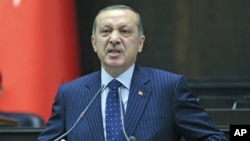Turkey's prime minister has for the first time officially apologized for the mass killing of Kurds in an uprising 80 years ago. The statement is seen by some as groundbreaking and the first step in the country facing up to its difficult past, but others see it as more to do with politics.
Prime Minister Recep Tayyip Erdogan addressed a meeting of supporters holding a copy of an historical paper, which he said documents the killing of nearly 14,000 Kurds in a rebellion in the 1930s. He then went on to do what no previous prime minister has done.
Erdogan said if there is need for an apology on behalf of the state, "I will apologize and I am apologizing."
The killings occurred between 1936 and 1938 in Dersim province. It was renamed Tunceli as part of the suppression of the rebellion, which also saw tens of thousands Kurds forced from their homes.
The mass killings of the restive Kurdish minority in Dersim, most of whom were civilians, have until recently remained a largely taboo subject for mainstream politics.
Observers say Erdogan's groundbreaking statement has as much to do with party politics, however, with the prime minister pointing out that the main opposition People's Republican Party, or CHP, was in power when the killings occurred.
It was the leader of that party, Kemal Kilicdaroglu, who demanded that Turkey acknowledge its past actions. Kilicdaroglu, who is from Tunceli, accused Erdogan of seeking to undermine the legacy of the founder of the Turkish Republic, Kemal Ataturk, who was in power at the time of the mass killings.
The Turkish government currently is fighting against Kurdish rebels, who are waging a campaign for autonomy in Turkey's largely Kurdish southeast. The fighting has killed more than 40,000 people since 1984. It is the latest of several uprisings by the Kurds that span more than a century.
Turkey's main pro-Kurdish party, the BDP, has questioned the sincerity of the prime minister's move, pointing out that mass arrests of its members and sympathizers continue.
The government maintains the arrests are part of its fight against the Kurdish insurgency, led by the Kurdistan Workers' Party, or PKK. More than 70 Kurds were detained this week, most of whom were lawyers. More than 1,000 Kurds have been arrested since Turkey's general election in June.
Turkey Officially Apologizes for 1930s Mass Killing of Kurds
- By Dorian Jones




